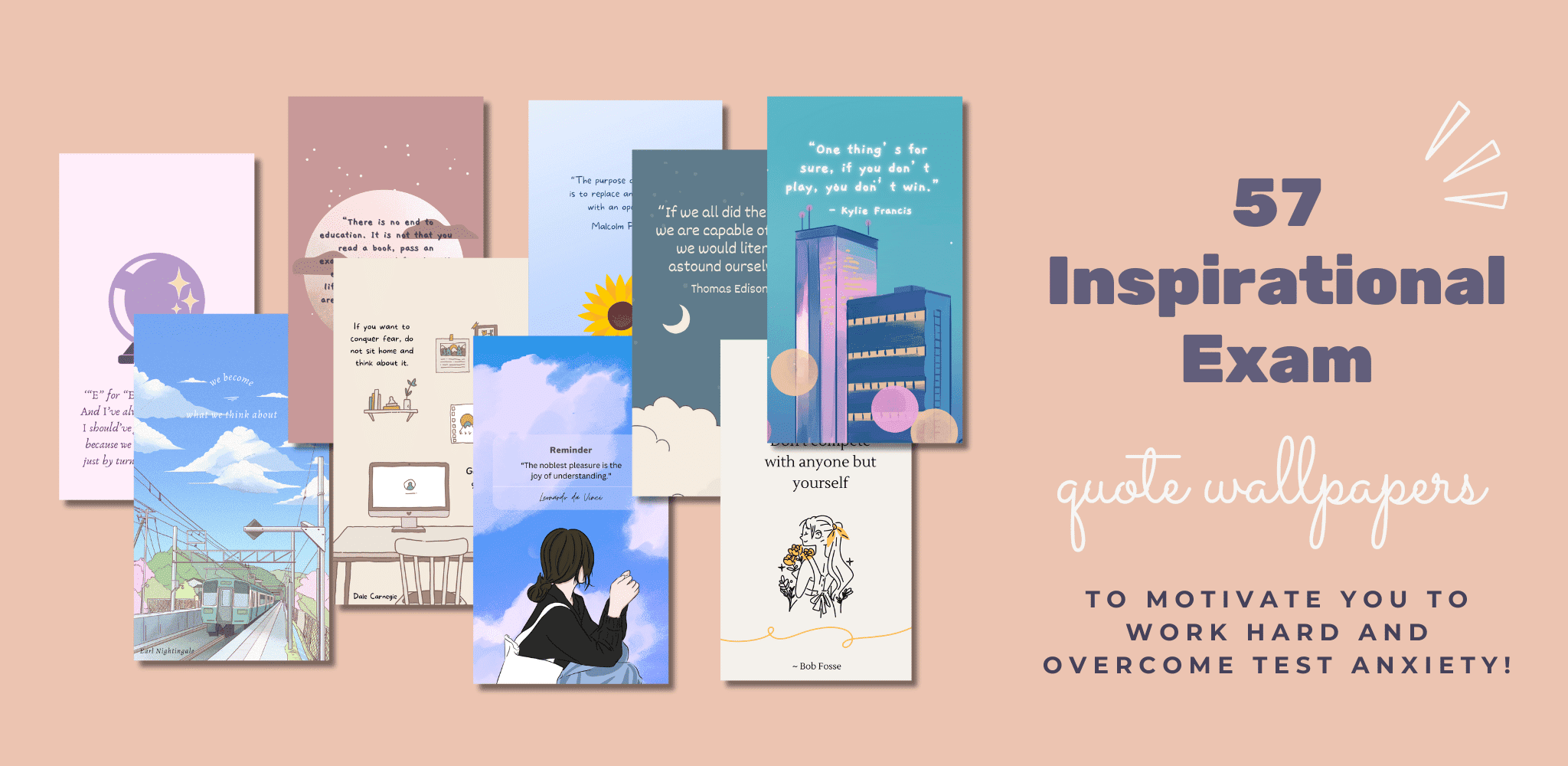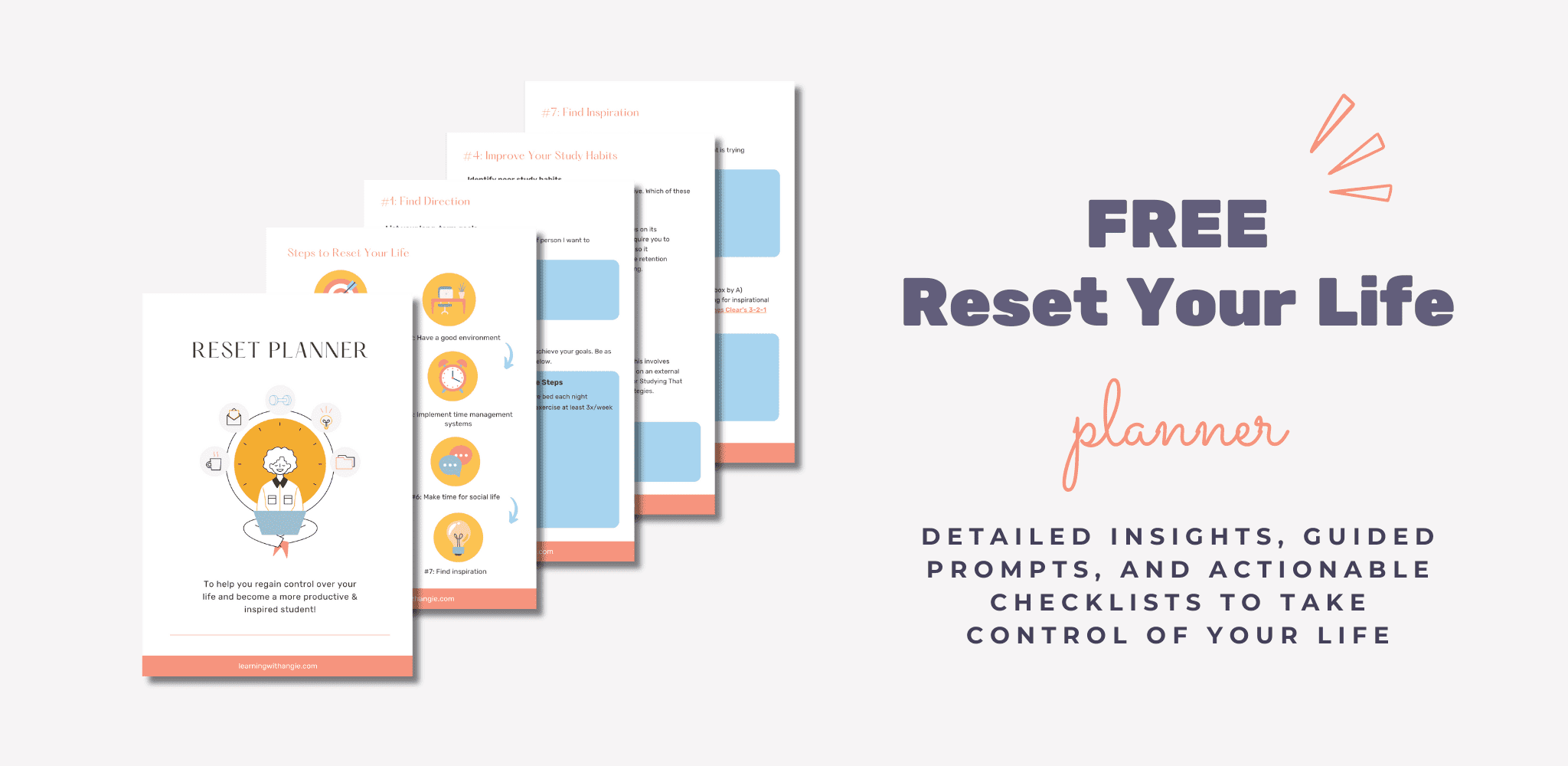
You need to study for an upcoming exam, but you just can’t seem to motivate yourself to start studying. Perhaps you’re overwhelmed by the amount of material you need to study. Or maybe you didn’t do well on a past exam and are worried that you won’t do well on the upcoming exam either.
Whatever the reason, you’re terrified to start studying, but you know you should. If this sounds like you, then you’ve come to the right place!
In this article, I’ll be covering:
- How fear affects studying
- Reasons why you’re scared to start studying
- A step-by-step guide on how to overcome fear of studying
By the end of this blog post, you’ll know how to stop letting inaction prevent you from making progress. You’ll also learn actionable steps to set you on the path toward achieving your academic potential.
Let’s jump in!
Why You Need to Confront Your Fear of Studying
Fear of studying (a.k.a. sophophobia) can have a myriad of negative consequences. Most immediately, it can hinder your ability to learn. In the long term, it drags down your self-confidence, which can cause you to miss opportunities for growth and thus limit your potential.
Do You Have a Fear of Studying?
If you have a fear of studying, you might experience the following:
Procrastination
You have a tendency to put off studying or avoid it altogether. You might find excuses, engage in distractions, or constantly delay your study sessions.
Thoughts like, “I had a long day at school today, so I deserve to watch an episode of my favorite show! Even if I do have a test tomorrow…” may cross your mind.
Feelings of Anxiety or Dread
You may experience increased anxiety or a sense of dread whenever you think about studying. You feel like there’s a mental block preventing you from picking up your notes or textbook.
Lack of Motivation
Fear can sap away your motivation and enthusiasm for learning. You might feel disinterested or even hopeless when you think about studying. Thoughts like, “What’s the point?” may cross your mind.
Negative Self-Talk and Self-Doubt
You might have thoughts like, “I’m not smart enough,” “I’ll never understand this,” or “I’m going to fail.”

Physical Symptoms
In some cases, the fear of studying can manifest as physical symptoms such as headaches, stomachaches, rapid heartbeat, sweating, or even panic attacks.
In Conclusion…
No matter how your fear of studying manifests itself, you can probably already see how harmful this fear is. All of the aforementioned symptoms lead to a negative cycle that can further reinforce your fear and prevent you from making progress.
For instance, if you’re a procrastinator, you’ll constantly put off studying for various excuses. As a result of not studying, you’ll be unable to do as well in school as you could. Unsatisfactory grades will exacerbate your fear of studying, leading to more procrastination… and well, you get it, the cycle continues.
That’s why confronting your fear of studying and taking actionable steps to conquer your fear is so important. You must break out of your negative cycle instead of being entrapped in it.
How Fear Affects Learning
You may not be aware of it, but fear also affects your ability to learn on a psychological level.
Fear Impairs Memory and Learning
Studies have shown that fear impairs the cognitive processes involved in learning, such as attention, concentration, and memory. When you’re in a state of fear, your brain’s resources are directed toward survival instincts rather than functions necessary for learning.
Fear can also influence memory formation and retention. While research suggests that moderate levels of stress hormones like cortisol can enhance memory and learning, excessive levels can hinder memory consolidation and retrieval.

The Self-Fulfilling Prophecy
In addition, the fear of failure can create a self-fulfilling prophecy. Simply put, the self-fulfilling prophecy posits that the anticipation of failure can lead to poorer performance. Conversely, the anticipation of success can lead to stronger performance.
If you think about it, this makes sense. If you believe in yourself, you’ll be more likely to study more diligently, and as a result, you’ll get better grades. However, if you lack self-confidence, you’ll be less motivated to study and thus get worse grades.
You Need to Confront Your Fear!
Fear of studying can take on many forms—procrastination, feelings of anxiety or dread, lack of motivation, negative self-talk, or physical symptoms. All of these manifestations will put you in a negative cycle of not working as diligently as you could be. Logically, this means that your fear prevents you from achieving as much as you could be!
Many studies have also shown that fear affects the neural processes involved in learning. Your fear of studying is not only preventing you from working hard—it’s also preventing you from absorbing information as well as you could be when you do study!
As I hope you’re thoroughly convinced by now, it’s crucial to confront your fear of studying if you want to achieve your academic potential. But in order to confront your fear of studying, you first need to identify what’s preventing you from studying. That leads me to the next section…
Why Can’t I Just Start Studying?
Every situation is unique, but you might be able to resonate with some of these cases:
Fear of Failure and Getting Bad Grades
The fear of receiving poor grades can really disrupt your study motivation. The thought of putting in lots of effort and then ending up with a disappointing grade can be downright terrifying.
You might not believe me now, but here’s the truth: grades aren’t everything. Later in this post, I’ll discuss how to develop a growth mindset and let go of the fear of failure. But for now, I simply want to introduce the idea that grades don’t matter as much as you think they do.
Sure, they provide some measure of our academic performance, but they don’t define your worth or intelligence. It’s entirely arbitrary to equate your self-worth with a letter or a number. If you do so, then you’ll find yourself constantly seeking validation through high marks. If you fall short, it can feel like a personal failure.
However, it’s important to remember that life is not linear. If you got unsatisfactory grades in the past, it doesn’t mean that you’ll continue getting bad grades because “you’re not smart enough”. It could simply mean that you’re not learning using effective study techniques. Or, perhaps you’re not managing your time well as a student and simply aren’t allotting enough time to study.
From a long-term perspective, the grades you get won’t determine the future trajectory of your life. Instead of fixating on grades as some arbitrary metric of self-worth, you should focus on the intrinsic value of learning.
Study because you’re excited by the content you’re learning, not to get a certain grade. This will make studying a more enjoyable and less daunting experience.
Unrealistic Expectations and Performance Pressure
We all want to excel and achieve great things. Sometimes, however, the pressure to excel that you put on yourself can ultimately hinder you.
If you just started your studies at a prestigious university where everyone’s a high-achiever, you may especially be able to relate to this. Imposter syndrome is common among college students who were the cream of the crop in high school, then thrust into a new academic environment where being the “cream of the crop” is the norm. You may feel like your accomplishments are less impressive than those of your peers. This may even cause you to feel like a fraud.
Ultimately, this feeling that you’re “not good enough” may hinder you from working as hard as you could be. However, it’s important to take a step back and reassess your perspective on academic achievements.
Firstly, it’s okay to make mistakes and not reach your sky-high expectations every time. In fact, making mistakes and failing is a crucial part of learning and growing.

Secondly, you shouldn’t set unrealistic expectations based on others’ achievements. For instance, you may feel unmotivated to study because you feel like no matter how hard you work, you won’t be able to get grades as good as Steven’s or Suzy’s, or whoever it is.
However, it’s essential to remember that everyone has different strengths, values, and interests. You should focus on developing your strengths, rather than assessing your weaknesses against someone else’s strengths. That’s a waste of your potential. (See this post for more on how to stop comparing yourself to others academically.)
Thirdly, you should focus on the process rather than the result (the high expectations you’ve set for yourself). Finding intrinsic value in what you’re learning will help you disengage yourself from extrinsic goals and make the process of learning more enjoyable.
Procrastination
Perhaps you don’t identify with the fear of bad grades or excessively high expectations. Maybe you’re just plagued by everyone’s much-feared nemesis: procrastination.
We’ve all been there, staring at a mountain of study material but still giving into the temptation of watching TikTok dance challenges. It’s tempting to put off studying, especially if you’re simply overwhelmed by the sheer amount of stuff you need to learn.
However, there are practical techniques to help you break the habit and develop effective time management skills. One of my favorite tactics is breaking tasks into smaller, manageable parts, as well as using productivity tools like an online Pomodoro timer, to-do list, or study app.
Later in this article, I’ll be discussing exactly how to create and stick to a study plan so that you can overcome study procrastination!
How to Overcome Fear of Studying—A Step-by-Step Guide
Now, it’s finally time to tackle the fear of studying and learn how to overcome it. This section is divided into three parts:
- Adopting a positive mindset
- Setting achievable goals and establishing good study habits
- Building resilience in the face of challenge
Part #1: Adopting a Positive Mindset
First, you need to let go of your fear and realize that it is possible to improve. Just because you’re not getting the results you want now doesn’t mean you can’t ever achieve them.
Don’t believe me? Try applying the following tips.
Cultivate Self-Awareness
If you’re terrified to start studying, it’s important to confront your fear head-on and identify the root cause. In the previous section, I already listed some possible causes: fear of getting bad grades, setting unrealistic expectations, and a habit of procrastination.
However, you could be scared of studying for a mix of these reasons or due to something else entirely. A helpful way to figure out what’s stopping you is to grab a pen-and-paper and simply jot down your feelings.
Often, when I’m scared to start something but can’t figure out what’s stopping me from starting, journaling helps me introspect and identify the root cause of my fear. For instance, a while back, I needed to learn something new but couldn’t seem to get myself to start. One of my mentors mentioned that I wasn’t making much progress, and it frustrated me greatly. Nevertheless, I felt like there was some barrier obstructing me from starting.

Frustrated by my lack of progress, I decided to grab my journal and jot down what I was feeling. After 2-3 pages of writing, I began to uncover hidden causes of my fear that I hadn’t been conscious of before. I realized how unreasonable these causes were, and this awareness helped me overcome my fear of starting.
Develop a Growth Mindset
If you struggle with a fear of studying, it may be because you have a conscious or subconscious belief that no matter how hard you work, you won’t be able to improve (whether that means understanding the material fully, getting satisfactory grades, or achieving some other expectation).
However, it’s essential to realize that your abilities can be developed and improved over time. But to improve, you need to adopt a growth mindset: you need to believe that improvement is 100% possible.
Here’s a little personal story:
I’ve never been much of a history person, so when I took my first rigorous history class, I felt completely overwhelmed. Nevertheless, I was set on getting good grades and doing the best I could. I took meticulous notes and spent many days studying for my first exam.
But.. I ended up getting a totally unsatisfactory grade and feeling very dejected afterward. However, instead of letting this drag me down, I decided to develop a new approach to the coursework. I realized that in preparation for the first exam, I had used a very inefficient and ineffective way of studying.
For the following exams, I learned to refine my learning and studying techniques. Ultimately, I was able to finish my second semester with an A-plus!
The lesson from this story is that adopting a growth mindset is a total game-changer. To overcome your fear of studying, you need to realize that you can improve. And as cheesy as it sounds, the first step is choosing to believe in your potential for improvement.
Set Realistic Goals and Expectations
You may struggle with setting unrealistic expectations. In fact, you may be so frightened by the prospect of not achieving your expectations that you’re too scared to try at all.
To combat this, you need to start setting realistic goals. If you want to become a straight-A student or win a certain academic award, you need to realize that such things don’t happen in a flash. However, that doesn’t mean that you can’t achieve these goals. You can. But to achieve them, you need to break down your ambitious long-term goals into immediately actionable steps.
For instance, if you’ve always done poorly in math and want to improve your grades in math, don’t set a goal like “get an A-plus on the next exam”. Instead, set a realistic, less daunting goal like “master [concept] by the end of the week by solving [number] practice problems”.
The difference between this goal and the first one is that the second one is immediately actionable. You can start working on it immediately instead of being too daunted to start! If you continue setting small, immediately actionable goals like this, imagine where you could be in a month, in two months, by the end of the semester!
Each small increment of progress is worthy of celebration. After all, the popular adage goes that every long journey begins with one small step.
To Wrap Up…
To develop a positive mindset, you should first try journaling to identify what’s stopping you from studying. Often, writing can help you uncover hidden causes and help you realize that what’s stopping you from starting is totally irrational!
Next, you need to believe that you can improve; changing your study habits and strategies can make a huge difference. (I’m speaking from personal experience!)
Lastly, you need to replace ambitious, far-reaching goals with immediately actionable ones.

That’s what this next section is about: developing a better study routine and setting more actionable goals.
Part #2: Setting Achievable Goals and Building a Good Study Routine
Now that you’re starting to believe in your potential to improve, it’s time to set goals that you can start working on immediately and establish a productive, consistent study routine.
Create a Study Plan
Creating a well-structured study plan that will help you achieve realistic goals is crucial. First, make a list of goals that you can achieve in the immediate future, such as:
- Understand how to apply the kinematics equations to problems for my physics class by the end of the week
- Get an A on my psychology quiz next week
- Take notes and analyze themes from Chapter 6 of my history textbook
Once you have set a list of achievable goals, it’s time to create your study plan. Progress is made through discipline and routine.
Personally, I like to time block my schedule at the beginning of the week. (Here’s a step-by-step guide on how to plan your week as a student.) Time blocking is simply allocating specific time slots to specific tasks.
On Sunday, I take a look at my schedule for the week—events, lectures, appointments—and set aside specific times each day for studying. Then, to make sure I study everything I need to, I will assign specific topics to each time slot. I’ll also mention how I intend to study topics. For example, say I really do have a psychology quiz coming up. For 3pm-5pm on Monday, I might create a task list like this:
- Study using flashcards
- Psychoanalytic perspective: intrapsychic structures and defense mechanisms, main psychologists
- Trait perspective: main psychologists, main personality trait tests
- Do practice questions at the end of the textbook chapter, check answers, and understand my mistakes
As I study each topic, I’ll check it off. This gives me an immediate sense of accomplishment that keeps me motivated.
You may be thinking: keeping track of all the topics I need to study and my study sessions is overwhelming! That’s where my favorite student planner app comes in: Notion. You can check out more about Notion by clicking on the link. Also, you can sign up to receive my free template below:
However, no matter what resources you use to create your plan, you need to make sure that:
- You set reasonable goals that you can begin working towards immediately.
- You create a clear schedule of when you’ll study specific topics and how.
Creating a study plan only takes around 10-20 minutes at the beginning of every week. Not only will it hold you accountable for studying, but it will also relieve you of the burden of deciding what to study and when. (You may not be aware of it, but the friction of not knowing what to study is a significant contributor to procrastination!)
Create a Study Ritual
Sometimes, you may have your schedule all laid out but discover that you don’t feel like studying. That’s where the study ritual comes in!
A study ritual is a short 2-5 minute activity that gets you in the mood for studying and signals your brain that it’s time to focus. Your ritual can be as simple as playing a motivational song, taking a few deep breaths, or even doing a quick stretching exercise.
Personally, I study first thing after getting ready in the morning. But it wasn’t always like this… When I first started including a morning study session, I had to create a ritual that got me motivated to start. I would make my favorite iced coffee and play a motivational song or two. Then, I’d sit down at my desk and start working.

Now, I no longer need to do these things to start my morning study session—sitting down to study after getting ready for the day is now instinctual for me. However, there are still “bad” days when I wake up and feel unmotivated. On those days, I follow my study ritual to help me get into the zone.
Implement Effective Study Techniques
As I mentioned, swapping poor study techniques for effective ones can make a huge difference (as I discovered in my history class). If you create an organized study plan but continue to use inefficient study techniques, you won’t see as much progress.
Common study habits like rereading notes, highlighting, or scanning the textbook are ineffective. Instead, here are some scientifically-proven study tips that I’ve found very useful:
- Active recall: This is all about pulling information from your head, rather than relying on your notes and textbook. Yes, it’s difficult. However, it’s also extremely effective because it forces you to develop a more solid understanding and retention of information. Examples of active recall include using flashcards and doing practice problems.
- Spaced repetition: This involves reviewing information at intervals over time to enhance long-term retention.
- Mnemonic devices: These are clever memory aids that help you remember complex information through creative associations (acronyms, rhymes, songs, or even vivid mental images). The most common example is the mnemonic used to remember the order of operations in math: “Please Excuse My Dear Aunt Sally”.
Check out this post for 7 detailed study tips that will help you memorize and understand things faster.
Seek Support and Guidance
Lastly, don’t be afraid to find help when you need it. If you’re stuck on something for a long time, it doesn’t mean that you’re “too stupid” to understand it. It often means that you need to learn the information from a different perspective.
If you’ve only learned about a concept through your textbook, try watching an online video. Or, for more personalized guidance, reach out to a teacher, TA, tutor, or peer for one-on-one help. You never know whose explanation might just make the concept click.
Additionally, building a network of peers can be a game-changer. Join study groups, engage in collaborative projects, or seek out online communities where you can connect with fellow learners. Together, you can share knowledge, exchange tips, and motivate each other.
Part #3: Building Resilience in the Face of Challenge
At this point, you’ve already learned the importance of believing in your capabilities and taking actionable steps to transform your study routine. Now, it’s time to learn about how to build resilience.
How can you stay motivated after getting a bad grade? How can you manage pre-exam anxiety? How can you create a positive study environment that keeps you going even when you’re tackling a difficult subject?
Embrace Failure as a Stepping Stone to Success
It’s essential to embrace failure as a valuable learning opportunity, rather than a dead end. It’s easy to get discouraged because there may be others around you who are getting better grades or receiving other academic recognition.

However, you shouldn’t fixate on other people’s successes because it’s easy to overlook the struggles behind them. (Also, everyone has different strengths, weaknesses, experiences, and resources, so it’s unfair to compare your achievements to those of others.)
When I first started this blog, I felt discouraged that I wasn’t getting as much traffic as other bloggers in my niche. I constantly saw other bloggers promoting their successes, and it made me feel disheartened. Where had I failed? What details had I overlooked?
It turned out that the mistakes I made along my blogging journey were extremely valuable. It was because I made these mistakes that I learned to refine my strategies and grow my blog faster. Through confronting the consequences of my mistakes and learning to manage them (rather than avoiding them), I also developed greater resilience in the face of challenges.
For instance, I used to get easily overwhelmed by unexpected issues. However, after having faced so many unexpected issues throughout my blogging process, I’ve become more cool-headed under stress.
Failure is essential because it helps you identify where you have room for improvement. Additionally, it helps you develop a more resilient attitude in the face of any kind of challenge.
Become More Process-Oriented, Not Goal-Oriented
While setting goals can provide a source of motivation, you can’t become too goal-oriented. That’s because it’s easy to get so fixated on results (e.g., good grades, winning an award) that you begin attributing your self-worth and satisfaction in life to those outcomes.
However, goals are fragile and unreliable. Here’s an example unrelated to academics: say you’re a top-tier athlete with the goal of winning a medal in the Olympics. Let’s say you earn a spot on the podium—of course, it’s an occasion to be joyful and proud.
However, if you were only fixated on the goal (winning the medal), then there’s no point in continuing the sport. What more is there to achieve, right?
Let’s say you don’t win anything. If you were only fixated on winning a medal, then you feel extremely discouraged—enough to want to stop training altogether. You worked so hard, and all for what?
You see, the problem with being goal-oriented is that goals have unreliable outcomes. Also, even if you do end up achieving a goal, there’s no point in continuing because what else is there to achieve?
The solution? Become process-oriented. Find joy and intrinsic value in the process, rather than fixating on results. The athlete that trains to participate in multiple Olympics is the athlete that’s in love with the sport itself, not the podium and the associated fame. Similarly, the student that continues to study no matter external factors—grades, awards, etc.—is the one that finds intrinsic value in the learning process itself.
Develop Techniques for Managing Exam Anxiety
Exam anxiety can make it difficult to find study motivation. However, there are some simple yet effective techniques to reduce test anxiety:
- Practice deep breathing exercises to calm down before an exam. Here is a simple breathing exercise from the National Health Services.
- Visualize yourself performing confidently and successfully in the exam. Remember, adopting a positive mindset can make a significant difference.
- Plan your study schedule in advance. Earlier in this article, I discussed how to set actionable goals and create an effective study plan. (Check out this article on planning your week as a student.) Creating a study plan that provides sufficient time to review all necessary topics and do practice can go a long way in boosting your confidence.
- Maintain a balanced lifestyle with sufficient rest, exercise, and healthy nutrition. Being energy-deprived will make you crankier and more anxious, so make sure to take good care of your body by following healthy routines.
Establish a Positive Study Environment
Having a good study environment can make you more excited to study and persist even through challenging topics. Here are some key tips:
Find a quiet, distraction-free space where you can fully concentrate on your studies. Keep your study area organized and clutter-free, as a messy workspace can be distracting. Here are my favorite student desk essentials for keeping my workspace clean and organized.
Also, personalize your study space with elements that bring you comfort and inspiration, such as motivational study quotes, plants, or soft background music. Personally, I also enjoy using aesthetic study websites and applying tips to romanticize studying.
As I mentioned earlier, finding a supportive, collaborative study group can also help you persist through difficult subjects.
All in all, doing these things has made my study sessions much more enjoyable!
Overview of How to Overcome Fear of Studying
We’ve (finally) arrived at the end of this article. To summarize quickly, the fear of studying can manifest itself as procrastination, feelings of anxiety or dread, lack of motivation, and self-doubt. Plus, research shows that it can impair memory and learning.
Therefore, it’s essential to confront this fear and take actionable steps to remove obstacles blocking you from your academic potential. To overcome the fear of studying, you need to:
- Adopt a positive mindset by identifying what’s stopping you from studying, believing in your ability to improve, and setting achievable goals.
- Establish achievable goals and a productive study routine by creating a study plan and study ritual, using effective study techniques, and seeking support when necessary.
- Build resilience by viewing failure as a learning opportunity, becoming process-oriented, managing exam anxiety, and creating a positive study environment.
To help you get started on building a positive mindset, you can download these aesthetic inspirational exam quote wallpapers:
For more on studying and self-improvement, check out:
- 7 Secret Tips For Studying That Will Transform How You Study
- Best All-in-One Aesthetic Planner App for Students
- How to Get Your Life Together as a Student + Life Reset Planner
- How to Stop Comparing Yourself to Others Academically
- How to Plan Your Week as a Student and Stick to Your Plan
- Morning to Night Routine for Students to Boost Productivity
- How to Journal for Self-Growth + Self-Growth Journal Template
What’s the first step you’ll take toward overcoming your fear of studying? Let me know in the comments below!

Learning With Angie is a place to share honest, unfiltered advice to promote student success. So if you’re a student (high school, college, or beyond) looking for tips on productivity, studying, personal growth, and more to reach your potential, this is the place! To read more about Learning with Angie, click here.























Hi Angie!
I must say, this article is a goldmine of insightful strategies for overcoming the fear of studying. As a student myself, I’ve often found myself grappling with procrastination and self-doubt when it comes to hitting the books. And I can say with certainty that this blog post is a comprehensive guide, with actionable steps to tackle these challenges head-on.
It’s incredible how journaling can unveil hidden barriers that hinder our progress.
Your emphasis on adopting a growth mindset is spot-on. The idea that improvement is always possible, even in the face of setbacks, is empowering.
Your story about refining study techniques and achieving success in your history class serves as a beacon of hope for students. It’s a reminder that with dedication and the right mindset, we can conquer any academic challenge.
I appreciate the practical advice on setting achievable goals. Your example of transitioning from lofty goals to actionable ones is inspiring. It’s a paradigm shift that every student should consider adopting.
Looking forward to more insightful content from you in the future!
Warm regards